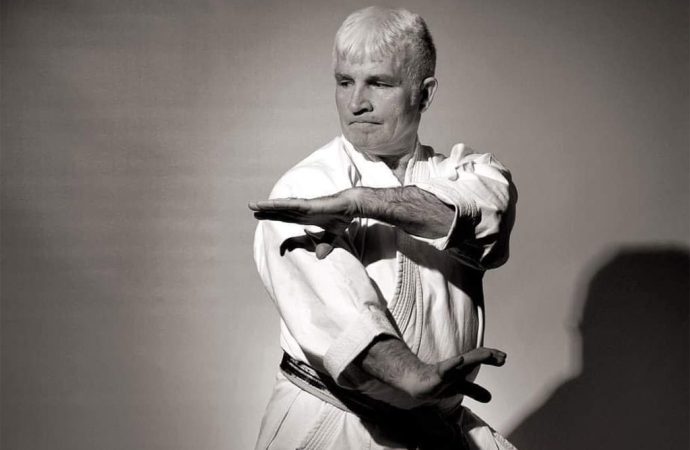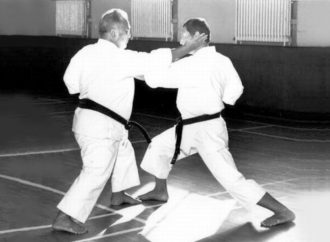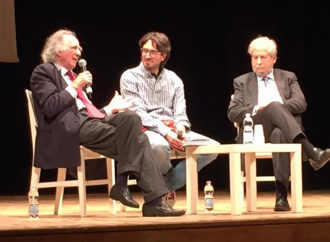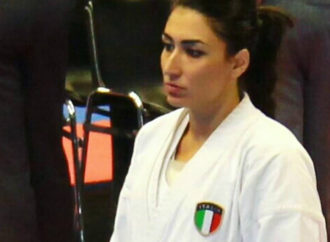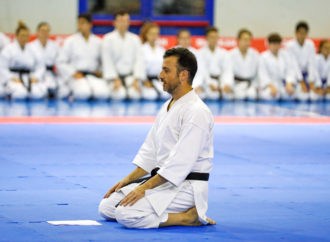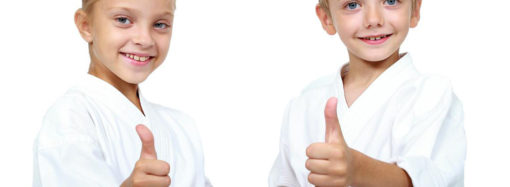Come membro della squadra KUGB, la mia prima competizione internazionale fu nell’ex Jugoslavia, la Golden Belt con i karateka più forti di tutto il mondo.
(Versione inglese in calce)
Di Angela Gasperini, Maestro HDKI UK
Bob Rhodes nasce a Leeds, North Yorkshire, il 3 marzo 1946. È uno degli insegnanti di karate più esperti del Regno Unito e insegna Shotokan da oltre 55 anni. È anche arbitro mondiale e internazionale di classe A, si è allenato con i più grandi nomi del Karate Shotokan ed ebbe come maestro e mentore riconosciuto Enoeda Sensei.
All’età di ventinove anni ho fatto parte della squadra di kumite che ha vinto in California nella finale contro il Giappone.
Maestro, come è nato il suo interesse per il Karate?
Avevo vent’anni ed ero curioso di imparare l’allenamento per l’autodifesa, così, a Leeds nel 1967, mi iscrissi al Budokan con un mio amico. Era principalmente un club di Judo dove si faceva un po’ di karate Shotokan ed essendo io un appassionato di sport, era abbastanza per stimolare un interesse per quel tipo di allenamento.
Quando poi sono diventato una cintura arancione, sono andato in un club perché stavano facendo jiyu kumite. Il ragazzo che gestiva il club era l’uomo “aduro” della zona in cui vivevo, si chiamava Ronnie Wade ed è diventato il mio istruttore senior.
Il 1967 fu l’inizio delle arti marziali nel Regno Unito.
Quali Maestri sono stati più importanti nel suo percorso di karateka e cosa ricorda del loro insegnamento?
Ho avuto tre istruttori principali che mi influenzarono, uno era proprio Ronnie Wade, che era già un concorrente internazionale di kumite, un ottimo combattente.
Dave Parkin, che era davvero forte nell’allenamento di base, e poi abbiamo avuto Chai Chowi, molto bravo nel kata. Più tardi arrivarono gli istruttori giapponesi che venivano al club per la valutazione: Kanazawa, Enoeda, Sumi, Takashi, Kato. Hanno visitato il nostro Club individualmente per una settimana alla volta, quattro volte l’anno. Abbiamo anche avuto una formazione annuale al Crystal Palace Residential con Shirai, Kase, Enoeda, Yahara, Nito, Osaka, Tomita, Kawasoe, Tabata, Tanaka e altri.
Quali ricordi ha delle sue competizioni?
La mia prima esperienza in una competizione è stata come cintura verde al KUGB National Championship come membro della squadra di Leeds che è arrivata seconda. Ho continuato a vincere nel kumite e nel kata, sia individuali sia a squadre, diverse volte ai campionati della regione settentrionale.
Come membro della squadra KUGB, la mia prima competizione internazionale fu nell’ex Jugoslavia, la The Golden Belt con i karateka più forti di tutto il mondo. Il team KUGB era allenato da Enoeda Sensei che all’epoca era anche il capo istruttore europeo.
Ho anche preso parte a molte competizioni internazionali contro paesi come il Giappone, per la GB All Styles Squad allenata da Sensei Arneil. Mi sono allenato e ho gareggiato al fianco di Billy Higgins, Terry O’Neil, Bob Poynton, Dave Hazard, Mick Dewey, Tikki Donovan, Eugene Codrington, Brian Fidkin e altri. All’età di ventinove anni ho fatto parte della squadra di kumite che ha vinto in California nella finale contro il Giappone.
Sento che recentemente il karate da competizione si sta allontanando troppo dall’idea del budo karate.
Com’è stato il suo esame di cintura nera?
Il mio primo esame di cintura nera è stato sotto Enoeda Sensei nel 1971, egli ha avuto un’enorme mia influenza su di me, nel corso degli anni è diventato il mio mentore e, a volte, è stato come un padre.
Ricordo il mio primo esame di cintura nera duro, sudato e “fisico”… come dovrebbero essere!
Quale altro esame ricorda della sua lunga carriera nel Karate?
Era con Kase Sensei, mi stava classificando per il 4° dan al Crystal Palace, a Londra. Kase Sensei si occupava del kata, Enoeda Sensei del kumite e Shirai Sensei del kihon.
Ricordo che ho eseguito Nijushiho e Kase mi ha chiesto di mostrare l’applicazione. Lo feci molto facilmente, perché avevo fatto dimostrazioni di Nijushiho bunkai diverse volte prima in occasione di eventi locali.
Che cosa pensa della distinzione tra karate olimpico e karate “tradizionale”?
Il karate tradizionale è il Budo, che significa allenamento per l’autodifesa praticando numerose tecniche. Testare le abilità nelle competizioni è solo una piccola parte del “viaggio” nel karate. Il karate che vediamo ai giochi olimpici è limitato dal numero di tecniche che possono essere utilizzate nei combattimenti da competizione, quindi, la tendenza potrebbe essere quella di concentrarsi solo su quelle tecniche. Sento che recentemente il karate da competizione si sta allontanando troppo dall’idea del budo karate.
Com’é diventato insegnante di karate?
Diventare un insegnante è stata una progressione naturale. Mi sono unito al mio istruttore Ronnie Wade quando è andato a insegnare in altri club e ho insegnato ai gradi inferiori. Ho continuato a insegnare come capo istruttore per più di trent’anni al Leeds Shotokan Karate Club. Mi è piaciuto insegnare nei club e fare corsi in tutto il Regno Unito e all’estero.
Che tipo di insegnante ritiene d’essere?
Niente sciocchezze! Sono un istruttore rigoroso e mi piace che i miei studenti si allenino duramente e con impegno. Io guido con l’esempio, dimostrando e partecipando all’allenamento. Dopo l’allenamento e al di fuori del dojo, sono felice di divertirmi e di socializzare con i miei studenti.
Il mio obiettivo è di insegnare agli studenti a diventare migliori di me e di ricordare sempre il rispetto, l’etichetta, l’umiltà e la modestia.
Io li motivo con l’esempio, dimostrando atteggiamento, spirito, tecnica e controllo.
Questo è per me il karate: la mia vita! Cerco di portare le qualità che ho menzionato prima come rispetto, umiltà e modestia in tutti gli aspetti della mia vita.
Il mio obiettivo è di insegnare agli studenti a diventare migliori di me.
Qual è il suo ruolo nella federazione HDKI?
Mi piacerebbe davvero insegnare e trasmettere le mie conoscenze ed esperienze di oltre cinquantacinque anni a tutti i membri dell’HDKI nel loro percorso da karateka.
Ho allenato molti atleti nazionali e internazionali come Randolph Williams, Sean Roberts, Nick Heald, Matt Price, Caroline Quansa e altri, portandoli al successo. Oltre che istruttore senior sono un arbitro mondiale e internazionale di classe A e spero di offrire la mia esperienza in questo aspetto del karate all’HDKI.
Interview with Bob Rhodes Sensei
As a member of the KUGB squad, my first International competition was in ex-Yugoslavia. It was The Golden Belt competition with the strongest Karateka from around the world.
By Angela Gasperini, Sensei HDKI UK
Bob Rhodes was born in Leeds, North Yorkshire on the 3rd of March 1946. He is one of the most experienced teachers in the UK instructing Karate Shotokan for over 55 years. He is an A Class World and International referee and he trained with the biggest names in Karate Shotokan.
At the age of 29 I was part of the Kumite squad that won in California in the final against Japan.
Sensei, how did your interest in karate begin?
I was 20 years old and I was curious about self-defence training.
It was in Leeds in 1967 when I joined The Budokan with my friend. It was mainly a Judo club with some karate Shotokan. As a keen sports person it was enough to stimulate an interest in that kind of training.
When I became an orange belt, I went to a club because they were doing jiyu kumite. The guy who ran the club was the hard man of the area where I used to live. His name was Ronnie Wade and he became my senior instructor.
1967 was the beginning of Martial arts in the UK.
Which Masters have been most important in your journey as a karateka and what do you remember about their teaching?
I had three main instructors who influenced me, one was Ronnie Wade. He was already an international kumite competitor, a very good fighter. Dave Parkin, he was really strong at basic training and then we had Chai Chowi, very good in Kata.
Later on, we had Japanese instructors coming to the club for grading – Kanazawa, Enoeda, Sumi, Takashi, Kato. They visited our Club individually for a week at a time, 4 times a year. We also had annual training at the Crystal Palace Residential with Shirai, Kase, Enoeda, Yahara, Nito, Osaka, Tomita, Kawasoe, Tabata, Tanaka and others.
What memories do you have of your competitions?
My first experience of competition was as a green belt at the KUGB National Championship as a member of the Leeds team which came second. I went on to win Kumite and Kata individual and team events several times at the Northern Region Championships. As a member of the KUGB squad, my first International competition was in ex-Yugoslavia. It was The Golden Belt competition with the strongest Karateka from around the world.
The KUGB team was coached by Enoeda Sensei, who was also the European Chief Instructor at the time.
I was also taking part in lots of international competitions against countries including Japan for the GB All Styles Squad coached by Sensei Arneil. I trained and competed alongside Billy Higgins, Terry O’Neil, Bob Poynton, Dave Hazard, Mick Dewey, Tikki Donovan, Eugene Codrington, Brian Fidkin and others. At the age of 29 I was part of the kumite squad that won in California in the final against Japan.
I feel that recently competition karate is going too far from the idea of Budo karate.
What was your black belt exam like?
My first black belt exam was under Enoeda Sensei in 1971. He was my biggest influence and mentor throughout the years and he was like a father to me at times.
I remember my first black belt exam as hard, sweaty and physical – as they should be!
What other exam do you remember from your long Karate career?
It was with Kase Sensei, he was grading me up to 4th Dan at Crystal Palace, in London. Kase was taking kata, Enoeda was taking kumite and Shirai was taking kihon. I remember I did Nijushiho and Kase asked me to show the application. I found this very easy because I had done demonstrations of Nijushiho bunkai several times before at local events.
What are your thoughts on the distinction between olympic karate and “traditional” karate?
Traditional karate is Budo which means training for self-defence, practising numerous techniques. Testing skills in competitions is only a small part of the karate journey.
The karate that we see at the Olympic games is limited by the number of techniques permitted to be used in competition fighting, so the tendency could be to only concentrate on those techniques. I feel that recently competition karate is going too far from the idea of Budo karate.
How did you become a karate teacher?
Becoming a teacher was a natural progression. I joined my instructor Ronnie Wade when he went to teach at other clubs and I taught the lower grades. I went on to become chief instructor for more than 30 years at Leeds Shotokan Karate Club. I have enjoyed my time teaching at clubs and courses around the UK and abroad.
What kind of teacher do you consider yourself to be?
No nonsense. I am a strict instructor and like my students to train hard and with commitment. I lead by example, demonstrating and joining in with training.
After training and outside of the dojo, I am happy to have fun and socialise with my students.
My aim is to teach students to become better than I was.
Always remember Respect, Etiquette, Humility and Modesty.
Teaching by example demonstrating attitude, spirit, technique and control.
This is what karate is to me: my life! I try to bring the qualities I mentioned earlier such as respect, humility, and modesty into all aspects of my life.
My aim is to teach students to become better than I was.
Which one is your role in HDKI federation?
I really would like to teach and pass on my knowledge and experience of over 55 years to all the members of the HDKI on their karate journeys.
I have coached many National and International competitors like Randolph Williams, Sean Roberts, Nick Heald, Matt Price, Caroline Quansa and others to success.
As well as a senior instructor I am an A Class World and International referee and hope to offer my experience in this aspect of karate to the HDKI.





